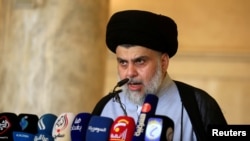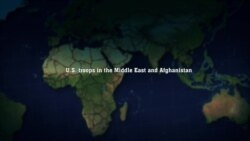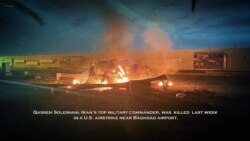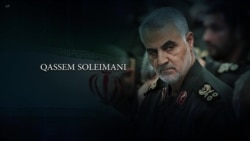Iraq’s influential Shiite cleric Muqtada al-Sadr escalated his rhetoric Tuesday against the U.S. influence in Iraq, calling civilians to participate in a "million-person" march for the removal of American troops in the country.
"O Soldiers of God and the nation, rush to a united and peaceful demonstration of millions, denouncing the American presence and its violations," al-Sadr said in a tweet to Iraqis.
Al-Sadr, whose political list won the most seats in the Iraqi 2018 legislative elections, has used his popularity in the past to draw thousands of zealous supporters to the streets, including the October 2019 protests over government corruption. He has since 2003 ardently opposed the U.S. presence in Iraq and for years used the now disbanded Mahdy Army to target U.S. troops.
WATCH: Tens of Thousands of US Troops are Stationed Near Iran
The cleric in his recent plea for rally expressed his frustration over the violation of Iraq’s sovereignty by "the occupying forces," saying he was confident that Iraqi protesters "will not bow down to global arrogance."
Global Arrogance
The term "global arrogance" is often used by Iran’s officials to refer to the United States and its Western and Israeli allies.
Al-Sadr’s call for protests comes as Iran’s state-sponsored AhlulBayt News Agency (ABNA) Tuesday reported an "important gathering" between him and "the commanders of Iraqi resistance” late Monday in Iran.
The meeting, attended by leaders of Hezbollah Battalion, the Movement of the Noble Ones, Asaib Ahl al-Haq, was "in the virtue of more coordination of Islamic resistance forces" and "in order to put an end to the American invaders’ presence in Iraq," ABNA reported, referring to three Shiite militant groups designated as terrorist organizations by the U.S.
Another meeting between al-Sadr’s political wing Saairun and Fatih coalition in the Iranian city of Qom Saturday agreed to choose Hadi al-Aameri as the head of "the Islamic Resistance in Iraq" following the U.S. killing of Iraqi Shiite leader Abu Mahdi al-Muhandis along with IRGC’s Qassem Soleimani, ABNA reported.
Relations between the United States and Iran faced a series of escalations in recent weeks after the U.S. accused Iranian proxy militias of targeting U.S. facilities in Iraq, including a rocket attack in Kirkuk province that killed an American contractor in late December and prompted American strikes on Kataeb Hezbollah facilities in Iraq and Syria.
WATCH: A Look at Soleimani's Axis of Resistance
The tensions reached a new level high after the U.S. embassy was sieged by pro-Iran protesters on Dec. 31, followed by a U.S. airstrike on January 3 that killed Iran’s top commander Soleimani along with several others. Iran on Jan. 8 responded by firing a barrage of ballistic missiles on at least two Iraqi bases housing U.S. troops.
WATCH: Qassem Soleimani: From Construction Worker to Architect of Iran's Middle East Expansion
In Iraq, where the Shiite-dominated government has condemned the U.S. airstrike as a violation of its sovereignty, the parliament last week passed a resolution that asked for the removal of American troops and other foreign forces. U.S. president Donald Trump, in return, has threatened to hit Iraq with severe sanctions.
Sherko Mirways, a Kurdish lawmaker and head of Iraqi parliament’s Foreign Relations Committee, told VOA that Iraq was entering "a dark tunnel," warning that Iraq’s leadership needs to take Trump’s threats seriously.
"We need to work together to deescalate the situation now and have a serious debate later about Iraq’s political direction and a balanced relation with the world," Mirways said.
The lawmaker said that Iraq was falling victim to the U.S.-Iran rivalry, adding that the country needed to work with both sides based on mutual interests.
VOA Kurdish Service’s Dlshad Anwar contributed to this report from Kirkuk, Iraq.








